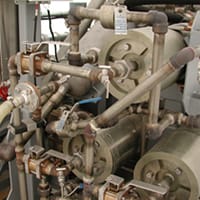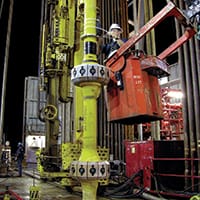Vibration Monitoring


Stress Engineering Services has a long history of solving a broad range of vibration problems involving structures, components, mechanical machinery, and process equipment. Our unique experience includes applications in offshore energy, refining, specialty chemical processing, lumber and paper mills, high speed manufacturing equipment, vehicles, consumer devices and medical products, to name a few.
The result of this broad range of application experience is an efficient, practical approach to problem solving. We have developed methods and practices that integrate field measurement, laboratory testing (if possible) and predictive analysis to quickly identify the source of a problem, and then to ‘test’ potential solutions either experimentally or computationally.
Monitoring Vortex-Induced Vibration
In offshore oil & gas development, vessels and platforms are continuously exposed to severe environmental conditions, including underwater currents. Marine risers, which act as a conduit for drilling, completion, workover, and intervention operations, are also susceptible to damage.
Under these extreme conditions, underwater currents can excite forced oscillations, known as Vortex-Induced Vibration (VIV). VIV can cause excessive fatigue damage to welds and couplings in riser strings.
Monitoring VIV fatigue on the upper riser joints of completion workover risers, and then quantifying fatigue damage, allows operators to assess risks associated with a given environment. It further aids in making prudent decisions that can minimize downtime and assist in avoiding lost revenue from mishaps. This ultimately leads to confidence in system integrity, and adds value to operations.
To combat this issue, we developed a Realtime Fatigue Monitoring System (RFMS) to monitor riser fatigue damage caused by VIV and wave loading. The RFMS employs our advanced vibration monitoring instrumentation and data acquisition capabilities, along with analytical modeling information, to define real-time stress and fatigue damage located anywhere in the riser system.
Related Capabilities
Stress Engineering Services helps people overcome the most difficult technical challenges with expert engineering solutions. We are proud to offer:



